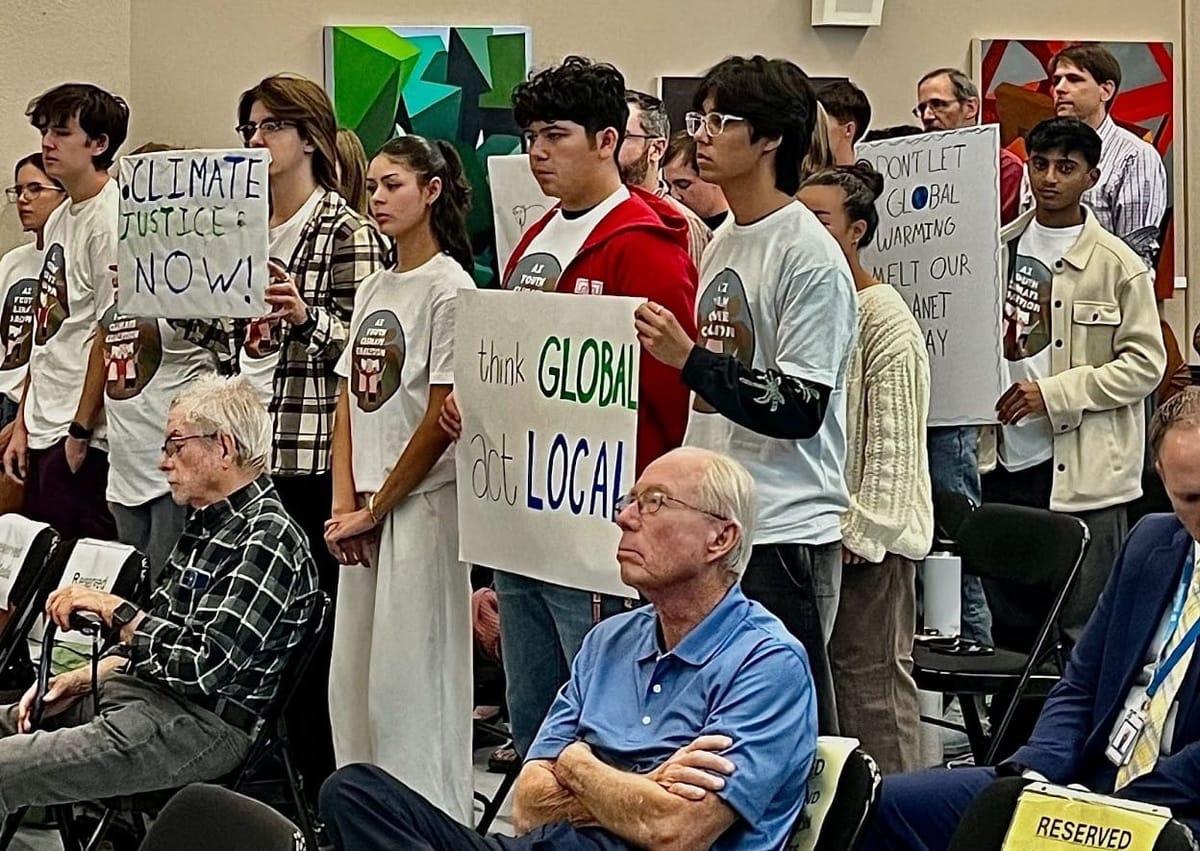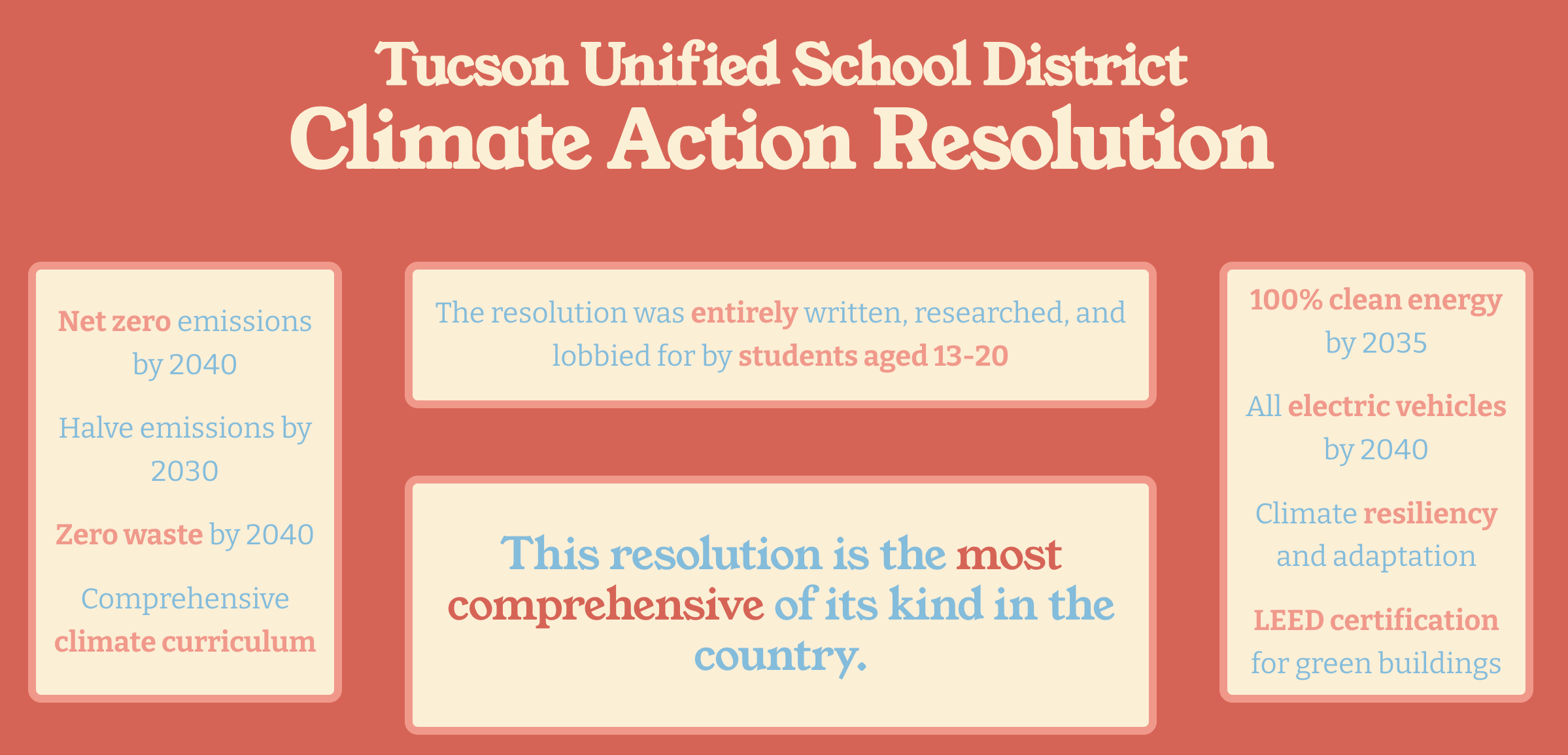TUSD passes groundbreaking youth-led climate action resolution
The resolution is the most comprehensive in the nation and sets targets including achieving net-zero emissions by 2040, a 50% reduction by 2030, and a commitment to 100% clean energy by 2035.

The governing board of Tucson's largest school district narrowly approved a nation-leading Climate Action Resolution Tuesday that was led, written and researched by students.
Tucson Unified School District’s governing board voted 3-2 to approve the measure, with members Sadie Shaw and Val Romero voting against it.
The resolution is the most comprehensive in the nation and sets targets including achieving net-zero emissions by 2040, a 50% reduction by 2030, and a commitment to 100% clean energy by 2035.
It was championed by the Arizona Youth Climate Coalition, a teen-led group of advocates ages 13 through 20. The group spent 16 months working with district leaders to craft the plan, which could become a guide for the nation’s 12,000 other school districts.
With a record-breaking 112 days of triple-digit temperatures this year, the urgency is clear. Student advocates say they’re fighting for their future and responding to climate crises they’re witnessing first-hand.
Now, they’re asking schools to help lead the charge.
Owen Brosanders, an AZYCC member and TUSD student, said the vote marks a major shift in how the district views climate action.
“The biggest accomplishment today was shifting perspective,” he said, referencing the concept of the Overton window—the range of policies deemed politically feasible. “We’re getting closer to the climate action we need to create a sustainable future.”
The resolution calls for TUSD to fully electrify its vehicle fleet by 2040, implement zero-waste programs, and ensure that all buildings meet Leadership in Energy and Environmental Design standards by 2035.
LEED is the world's most widely used green building rating system and provides a framework for buildings which offer environmental, social and governance benefits
Additional efforts to promote sustainability include locally sourcing food, composting and eliminating single-use plastics.
The district also plans to address Tucson’s rising temperatures through initiatives such as cooling centers, cool roofs, and an expanded tree canopy.
As a student who witnesses the district’s infrastructure issues daily, including a lack of working bathrooms, Brosanders acknowledges the ongoing challenge of funding.
“Funding is always going to be an issue, and I see these issues in my day-to-day,” he said, addressing concerns raised by governing board Member Sadie Shaw and others.
Brosanders emphasized the importance of learning from successful local initiatives, like the Tucson Climate Action Plan, which has achieved a 32-to-1 return on investment, according to the City of Tucson.
He also stressed the need for expert evaluations that go beyond the district’s usual cost-benefit analysis, noting that this broader approach is essential to fully capture the far-reaching impact of climate action.
Ojas Sanghi, a University of Arizona student and AZYCC member, said the resolution received overwhelming community support. Dozens of youth and community members attended meetings or submitted written comments in favor of the resolution.
“It’s so inspiring to see that people in Tucson care about climate action and support the youth leading this effort,” he said. “This is the start of the work. Saying that we’re going to do it is easy; the hard part is actually doing it.”

Looking forward, Brosanders said the AZYCC plans to help other districts replicate the resolution’s impact.
“We’re already talking about making a plan for how you can pass this in your own district, like a toolkit,” he said.
Student and supporter Eddie Barrón talked about the need for TUSD’s curriculum to be science-based, accurate, and age-appropriate, spanning elementary through high school.
He highlighted plans within the resolution to establish career pathways in green jobs, integrate climate-focused courses, and create partnerships that promote sustainability education through community gardens, literacy initiatives, and hands-on learning.
Expanding outdoor learning opportunities and addressing climate-related anxiety among students are also key priorities within the resolution, he added.
To ensure transparency, TUSD will create a public dashboard to track progress and has committed to achieving real emission reductions without relying on carbon credits.
The district will appoint a “climate champion” to oversee resource distribution and equity across schools. Funding for these initiatives will come from a mix of TUSD bonds, grants, and provisions from the Inflation Reduction Act.
This resolution, largely driven by AZYCC’s work, aims to set an example for the country’s other school districts, while also giving other students hope for the future.
“This resolution represents a vision of hope and promise, and we hope it inspires young students here and across the country,” Sanghi said.
Angelina Maynes is a journalism major at the University of Arizona and reporter with Tucson Spotlight. Contact her at angelinamaynes@arizona.edu.
Tucson Spotlight is a community-based newsroom that provides paid opportunities for students and rising journalists in Southern Arizona. Please support our work with a paid subscription.



